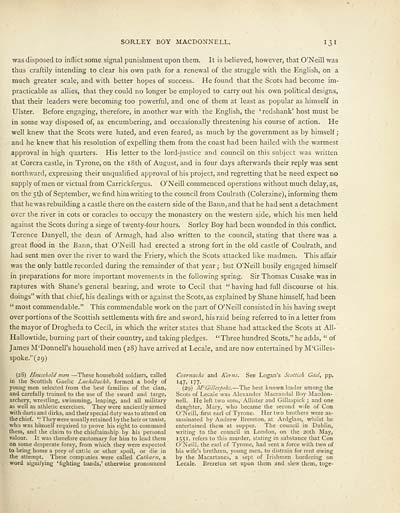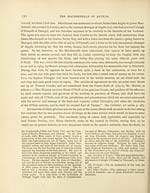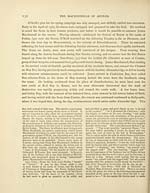Historical account of the Macdonnells of Antrim
(145) Page 131
Download files
Complete book:
Individual page:
Thumbnail gallery: Grid view | List view

SORLEY BOY MACDONNELL. 13 I
was disposed to inflict some signal punishment upon them. It is believed, however, that O'Neill was
thus craftily intending to clear his own path for a renewal of the struggle with the English, on a
much greater scale, and with better hopes of success. He found that the Scots had become im-
practicable as allies, that they could no longer be employed to carry out his own political designs,
that their leaders were becoming too powerful, and one of them at least as popular as himself in
Ulster. Before engaging, therefore, in another war with the English, the ' redshank' host must be
in some way disposed of, as encumbering, and occasionally threatening his course of action. He
well knew that the Scots were hated, and even feared, as much by the government as by himself ;
and he knew that his resolution of expelling them from the coast had been hailed with the warmest
approval in high quarters. His letter to the lord-justice and council on this subject was written
at Corcra castle, in Tyrone, on the 18th of August, and in four days afterwards their reply was sent
northward, expressing their unqualified approval of his project, and regretting that he need expect no
supply of men or victual from Carrickfergus. O'Neill commenced operations without much delay, as,
on the 5th of September, we find him writing to the council from Coulrath (Coleraine), informing them
that he was rebuilding a castle there on the eastern side of the Bann,and that he had sent a detachment
over the river in cots or coracles to occupy the monastery on the western side, which his men held
against the Scots during a siege of twenty-four hours. Sorley Boy had been wounded in this conflict.
Terence Danyell, the dean of Armagh, had also written to the council, stating that there was a
great flood in the Bann, that O'Neill had erected a strong fort in the old castle of Coulrath, and
had sent men over the river to ward the Friery, which the Scots attacked like madmen. This affair
was the only battle recorded during the remainder of that year; but O'Neill busily engaged himself
in preparations for more important movements in the following spring. Sir Thomas Cusake was in
raptures with Shane's general bearing, and wrote to Cecil that "having had full discourse ot his
doings" with that chief, his dealings with or against the Scots, as explained by Shane himself, had been
" most commendable." This commendable work on the part of O'Neill consisted in his having swept
over portions of the Scottish settlements with fire and sword, his raid being referred to in a letter from
the mayor of Drogheda to Cecil, in which the writer states that Shane had attacked the Scots at All-
Hallowtide, burning part of their country, and taking pledges. "Three hundred Scots," he adds, " of
James M'Donnell's household men (28) have arrived at Lecale, and are now entertained by M'Gilles-
spoke."(2o)
(2S) Household men — These household soldiers, called Cearnachs and Kerns. See Logan's Scottish Gael, pp.
in the Scottish Gaelic Luckdlachk, formed a body of 147, 177.
young men selected from the best families of the clan, (29) M'Gillespoke. — The best known leader among the
and carefully trained to the use of the sword and targe, Scots of Lecale was Alexander Macrandal Boy Macdon-
archery, wrestling, swimming, leaping, and all military nell. He left two sons, Allister and Gillaspick ; and one
as well as athletic exercises. They were anciently armed daughter, Mary, who became the second wife of Con
with darts and dirks, and their special duty was to attend on O'Neill, first earl of Tyrone. Her two brothers were as-
thechief. "They were usually retained by the heir or tanist, sassinated by Andrew Brereton, at Ardglass, whilst he
who was himself required to prove his right to command entertained them at supper. The council in Dublin,
them, and the claim to the chieftainship by his personal writing to the council in London, on the 20th May,
valour. It was therefore customary for him to lead them 155 1 , refers to this murder, stating in substance that Con
on some desperate foray, from which they were expected O'Neill, the earl of Tyrone, had sent a force with two of
to bring home a prey of cattle or other spoil, or die in his wife's brethren, young men, to distrain for rent owing
the attempt. These companies were called Catharn, a by the Macartanes, a sept of Irishmen bordering on
word signifying 'fighting bands,' otherwise pronounced Lecale. Brereton set upon them and slew them, toge-
was disposed to inflict some signal punishment upon them. It is believed, however, that O'Neill was
thus craftily intending to clear his own path for a renewal of the struggle with the English, on a
much greater scale, and with better hopes of success. He found that the Scots had become im-
practicable as allies, that they could no longer be employed to carry out his own political designs,
that their leaders were becoming too powerful, and one of them at least as popular as himself in
Ulster. Before engaging, therefore, in another war with the English, the ' redshank' host must be
in some way disposed of, as encumbering, and occasionally threatening his course of action. He
well knew that the Scots were hated, and even feared, as much by the government as by himself ;
and he knew that his resolution of expelling them from the coast had been hailed with the warmest
approval in high quarters. His letter to the lord-justice and council on this subject was written
at Corcra castle, in Tyrone, on the 18th of August, and in four days afterwards their reply was sent
northward, expressing their unqualified approval of his project, and regretting that he need expect no
supply of men or victual from Carrickfergus. O'Neill commenced operations without much delay, as,
on the 5th of September, we find him writing to the council from Coulrath (Coleraine), informing them
that he was rebuilding a castle there on the eastern side of the Bann,and that he had sent a detachment
over the river in cots or coracles to occupy the monastery on the western side, which his men held
against the Scots during a siege of twenty-four hours. Sorley Boy had been wounded in this conflict.
Terence Danyell, the dean of Armagh, had also written to the council, stating that there was a
great flood in the Bann, that O'Neill had erected a strong fort in the old castle of Coulrath, and
had sent men over the river to ward the Friery, which the Scots attacked like madmen. This affair
was the only battle recorded during the remainder of that year; but O'Neill busily engaged himself
in preparations for more important movements in the following spring. Sir Thomas Cusake was in
raptures with Shane's general bearing, and wrote to Cecil that "having had full discourse ot his
doings" with that chief, his dealings with or against the Scots, as explained by Shane himself, had been
" most commendable." This commendable work on the part of O'Neill consisted in his having swept
over portions of the Scottish settlements with fire and sword, his raid being referred to in a letter from
the mayor of Drogheda to Cecil, in which the writer states that Shane had attacked the Scots at All-
Hallowtide, burning part of their country, and taking pledges. "Three hundred Scots," he adds, " of
James M'Donnell's household men (28) have arrived at Lecale, and are now entertained by M'Gilles-
spoke."(2o)
(2S) Household men — These household soldiers, called Cearnachs and Kerns. See Logan's Scottish Gael, pp.
in the Scottish Gaelic Luckdlachk, formed a body of 147, 177.
young men selected from the best families of the clan, (29) M'Gillespoke. — The best known leader among the
and carefully trained to the use of the sword and targe, Scots of Lecale was Alexander Macrandal Boy Macdon-
archery, wrestling, swimming, leaping, and all military nell. He left two sons, Allister and Gillaspick ; and one
as well as athletic exercises. They were anciently armed daughter, Mary, who became the second wife of Con
with darts and dirks, and their special duty was to attend on O'Neill, first earl of Tyrone. Her two brothers were as-
thechief. "They were usually retained by the heir or tanist, sassinated by Andrew Brereton, at Ardglass, whilst he
who was himself required to prove his right to command entertained them at supper. The council in Dublin,
them, and the claim to the chieftainship by his personal writing to the council in London, on the 20th May,
valour. It was therefore customary for him to lead them 155 1 , refers to this murder, stating in substance that Con
on some desperate foray, from which they were expected O'Neill, the earl of Tyrone, had sent a force with two of
to bring home a prey of cattle or other spoil, or die in his wife's brethren, young men, to distrain for rent owing
the attempt. These companies were called Catharn, a by the Macartanes, a sept of Irishmen bordering on
word signifying 'fighting bands,' otherwise pronounced Lecale. Brereton set upon them and slew them, toge-
Set display mode to:
![]() Universal Viewer |
Universal Viewer | ![]() Mirador |
Large image | Transcription
Mirador |
Large image | Transcription
Images and transcriptions on this page, including medium image downloads, may be used under the Creative Commons Attribution 4.0 International Licence unless otherwise stated. ![]()
| Histories of Scottish families > Historical account of the Macdonnells of Antrim > (145) Page 131 |
|---|
| Permanent URL | https://digital.nls.uk/95342987 |
|---|
| Description | A selection of almost 400 printed items relating to the history of Scottish families, mostly dating from the 19th and early 20th centuries. Includes memoirs, genealogies and clan histories, with a few produced by emigrant families. The earliest family history goes back to AD 916. |
|---|

